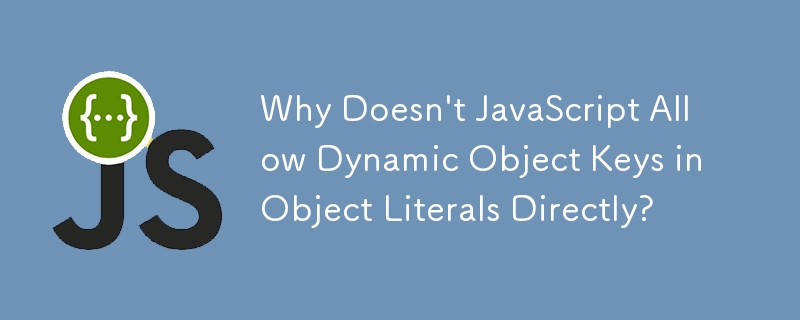Home >Web Front-end >JS Tutorial >Why Doesn't JavaScript Allow Dynamic Object Keys in Object Literals Directly?
Why Doesn't JavaScript Allow Dynamic Object Keys in Object Literals Directly?
- Patricia ArquetteOriginal
- 2024-12-30 21:48:15987browse

JavaScript Object Key from Variable Conundrum
When using object literals in JavaScript, you may encounter a peculiar behavior where assigning a variable to a dynamic property key does not work. Consider these two code snippets:
<something>.stop().animate({ 'top': 10 }, 10); // Works
var thetop = 'top';
<something>.stop().animate({ thetop: 10 }, 10); // Doesn't work
Why the Discrepancy?
The first snippet successfully sets the "top" property of an object, utilizing the dot notation. However, the second snippet fails because JavaScript does not allow using variables to define dynamic object property names directly in object literals.
Solution in ES5 and Earlier
To assign dynamic property names from variables in ES5 and earlier, you must construct the object literal manually:
var thetop = "top";
var aniArgs = {};
aniArgs[thetop] = 10; // Assign value to variable property name
<something>.stop().animate(aniArgs, 10);
Solution in ES6 and Later
ES6 introduced "ComputedPropertyName" in object literal grammar, enabling the assignment of dynamic property names from variables directly:
var thetop = "top",
obj = { [thetop]: 10 };
console.log(obj.top); // -> 10
This syntax is supported in the latest versions of major browsers.
The above is the detailed content of Why Doesn't JavaScript Allow Dynamic Object Keys in Object Literals Directly?. For more information, please follow other related articles on the PHP Chinese website!
Related articles
See more- An in-depth analysis of the Bootstrap list group component
- Detailed explanation of JavaScript function currying
- Complete example of JS password generation and strength detection (with demo source code download)
- Angularjs integrates WeChat UI (weui)
- How to quickly switch between Traditional Chinese and Simplified Chinese with JavaScript and the trick for websites to support switching between Simplified and Traditional Chinese_javascript skills

